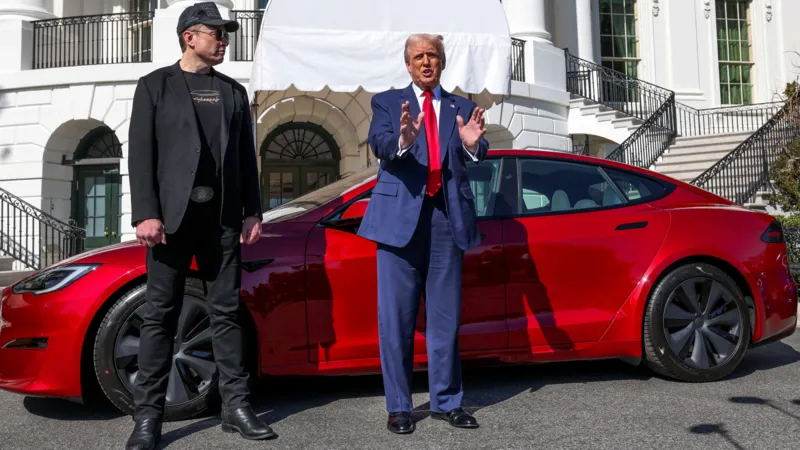Elon Musk, the CEO of Tesla, is making headlines again, but this time it’s for scaling back his political involvement after the electric car giant reported significant drops in both profits and car sales for the beginning of this year. Musk, who has been leading the Department for Government Efficiency (Doge) since its inception last year, said he would “significantly reduce” his time in this role, citing the need to devote more attention to Tesla’s challenges.
Musk, who has been at the center of U.S. government efficiency efforts, will now only allocate one to two days per week to Doge starting next month. This move follows mounting criticism that his focus has shifted too much from Tesla, resulting in boycotts and protests against the company’s vehicles. While Musk’s political role has stirred controversy globally, it has also put him under pressure to address Tesla’s financial performance.
As a temporary government employee, Musk is subject to a limit of 130 workdays per year. This limit, which has been in place since President Donald Trump’s inauguration, is set to expire soon, leading to questions about when exactly Musk will step down from his advisory position. For now, Musk has indicated that he will remain in the role as long as it’s beneficial, particularly for President Trump, whom he has strongly supported with substantial financial contributions.
However, Musk’s priorities are shifting. “I’ll be allocating far more of my time to Tesla,” he said. Despite this, he suggested he won’t completely sever ties with the government, calling his work “critical” and pledging to stay involved as long as it’s deemed useful.
Tesla’s first-quarter results, released this week, underscore the urgency of Musk’s decision to focus more on the company. Sales dropped by 20% compared to the same period last year, and profits plummeted by more than 70%. The company also warned that it expects the pain to continue, citing “changing political sentiment” as a potential threat to demand.
The tough financial situation has also been compounded by a growing backlash against Musk’s political and business entanglements. Musk attributed much of the boycott against Tesla cars to those trying to “attack me and the Doge team,” but despite the company’s struggles, Tesla’s stock saw a slight rebound after-hours, rising 5% following the earnings report. However, with shares still down 37% for the year, investors are clearly uneasy.
The ongoing trade war, particularly President Trump’s tariffs on China, has also weighed heavily on Tesla’s operations. Although Tesla’s cars are assembled in the U.S., the company relies on parts made in China. Musk acknowledged that the “rapidly evolving trade policy” could disrupt Tesla’s supply chains and raise costs, further complicating the company’s financial outlook.
While Musk remains vocal about the challenges posed by tariffs, including his past clashes with trade adviser Peter Navarro, he continues to advocate for lower tariffs. Despite this, he admitted that even with localized supply chains in North America, Europe, and China, tariffs are still difficult for Tesla to absorb, especially as margins remain thin.
In the face of these mounting challenges, some are urging Musk to refocus on what he does best. Georg Ell, a former Tesla executive, suggested that if Musk dedicates more time to the companies where he excels, Tesla could regain its focus on product quality and customer experience. Ell, now CEO of translation software firm Phrase, emphasized that Musk’s single-minded approach may be both a strength and a limitation.
As for the future, Musk remains confident that Tesla can recover, pointing to artificial intelligence as a key driver for growth. However, investors are not as convinced, with some calling expectations for the company “rock-bottom” after Tesla reported a 13% drop in vehicle sales for the quarter, marking its lowest level in three years.
Analysts warn that Tesla is facing increased competition and that the risks from the ongoing trade war, as well as potential disruptions in global supply chains, could create further hurdles. As Tesla’s problems mount, all eyes will be on Musk to see if his renewed focus on the company can turn things around.



